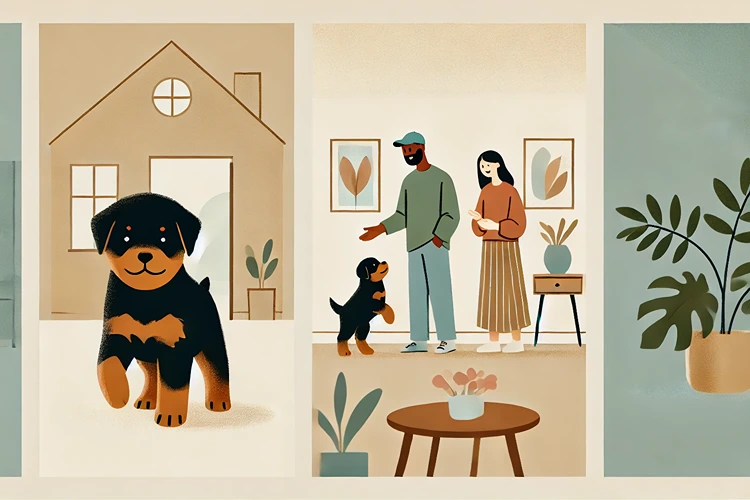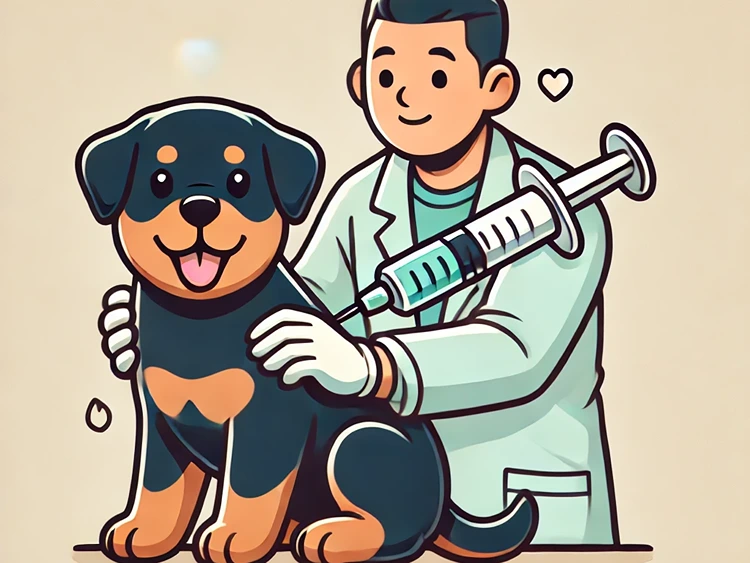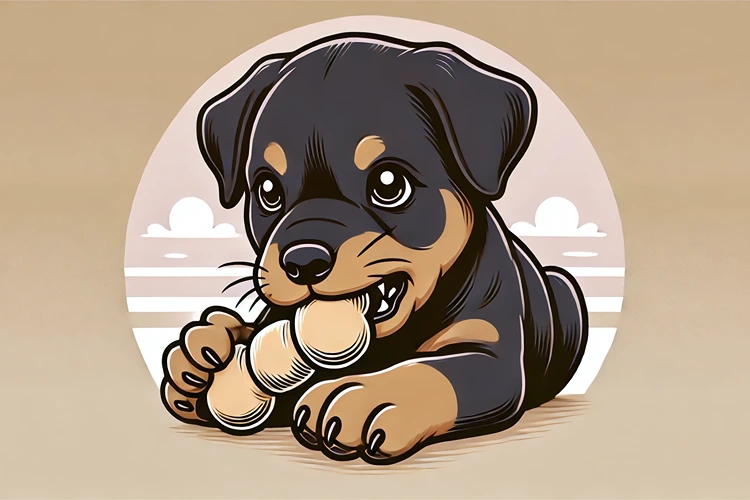The age at which you bring home a Rottweiler puppy plays a critical role in their development. Puppies go through various stages of growth, each one affecting their behavior and how they interact with the world. The most important stage for socialization typically falls between 8 and 12 weeks. So, when you’re considering bringing a Rottweiler puppy home, timing is everything.
The early weeks of a puppy’s life are when they learn how to navigate the world. During this time, they start understanding basic social cues, build bonds with people, and interact with other animals. Missing this crucial period or bringing them home too early can lead to long-term behavioral issues. Let’s break it down further.
What Is the Best Age to Bring a Rottweiler Puppy Home?
The ideal age to bring a Rottweiler puppy home is between 8 and 10 weeks. This window is the sweet spot for socialization. By this time, puppies have already learned key behaviors from their mother and littermates, such as bite inhibition, playing, and exploring boundaries. They are mentally ready to start bonding with humans and learning from their new environment.
Bringing a puppy home at 8 weeks also allows you to expose them to new experiences during their “critical socialization period,” which happens between 8 and 16 weeks. This is the best time to introduce them to various environments, people, sounds, and animals to help them become well-rounded adults.
Paw-some Tip:
If you bring your Rottweiler puppy home at 8 weeks, start gradually introducing them to different people and places. Let them explore safely at their own pace, ensuring each new experience is positive to foster confidence.
What Happens If You Bring a Puppy Home Too Early?
Bringing a Rottweiler puppy home before they’re ready can have lasting consequences. If a puppy is separated from their littermates before 8 weeks, they may miss out on learning essential social skills. Puppies learn critical lessons from interacting with their siblings and mother, like how to control their bite and understand social hierarchies.
Without this early education, a puppy may grow up with issues such as aggression, fearfulness, or difficulties interacting with other dogs. Additionally, young puppies are more vulnerable to stress and anxiety when placed in a new environment without their mother or littermates to guide them.
Rottie Stats:
According to a 2019 study, puppies who are rehomed before 8 weeks are significantly more likely to display behavioral problems later in life, such as excessive barking and fear-based aggression.
What Are the Benefits of Bringing a Rottweiler Puppy Home at 8 Weeks?
When you bring a Rottweiler puppy home at around 8 weeks, you’re setting them up for success. At this age, they are open to learning new things, and they start forming strong attachments with their new family. Here are some key benefits:
- Early Socialization: You can introduce your puppy to a wide variety of social experiences, from meeting different people to encountering other dogs and pets.
- Bonding with Family: Your Rottweiler puppy will start building a close bond with their human family, creating a foundation for trust and companionship.
- Positive Habits: Puppies are impressionable at this age, making it the perfect time to introduce house training, crate training, and basic commands like “sit” and “stay.”
How to Start Socializing Your Rottweiler Puppy
Once you bring your Rottweiler puppy home, you’ll want to start the socialization process right away. The key is to expose them to new experiences in a safe, controlled manner. Here’s how to get started:
- Introduce Your Puppy to Different People: Start with people in your household, then slowly widen their social circle. Let them meet visitors, neighbors, and friends, but make sure these interactions are calm and positive.
- Expose Them to New Environments: Take your puppy on short trips to different locations like parks, quiet streets, or friends’ homes. It’s essential that they get used to new surroundings early on.
- Familiarize Them with Sounds: Rottweilers are known for their calm demeanor, but it’s still important to expose them to different sounds early. Play recordings of household noises, traffic, or even fireworks at low volumes to help them adjust.
Paw-some Tip:
Start with shorter socialization sessions—no longer than 10-15 minutes—so your puppy doesn’t get overwhelmed. Reward calm behavior with treats to reinforce positive experiences.
Puppy Development Timeline for Socialization
| Age | Development Stage | Key Socialization Activities |
|---|---|---|
| 8 Weeks | Critical Socialization Period Begins | Introduce puppy to household members, start crate training, and begin housebreaking. |
| 10 Weeks | Bonding and Basic Training | Start basic commands like “sit” and “stay.” Introduce new people gradually. |
| 12 Weeks | Confidence Building | Expose to new environments, sounds, and other animals. Take short car rides. |
| 16 Weeks | Critical Socialization Period Ends | Continue positive reinforcement and consistent socialization efforts. |
Is It Ever Too Late to Socialize a Rottweiler Puppy?
While the optimal window for socialization occurs between 8 and 16 weeks, it’s never too late to work on socializing your Rottweiler. However, as they grow older, they may become more set in their ways, making it harder to introduce new experiences.
Older Rottweilers can still learn to adapt to new environments and experiences, but it will take more time, patience, and consistency. Puppies who haven’t had much socialization early on may display fear or aggression when encountering new things. In these cases, you’ll want to work gradually to introduce them to new people, places, and experiences in a way that helps them feel secure.
What Should You Avoid During Early Socialization?
While socialization is essential, it’s important to avoid overwhelming your Rottweiler puppy during these early stages. Puppies can easily become stressed or frightened if they are pushed too far too fast. Here are some things to avoid:
- Forcing Interactions: Let your puppy approach people, animals, and new situations at their own pace. If you force them into an environment they’re uncomfortable with, it may backfire, causing anxiety or aggression later on.
- Overstimulating Your Puppy: New sights, sounds, and smells can be exciting, but too much at once can be overwhelming. Limit socialization sessions to short periods, and give your puppy plenty of time to rest and process their experiences.
- Neglecting Positive Reinforcement: Socialization should always be a positive experience. Use treats, praise, and affection to reward your puppy for calm and confident behavior in new situations. Avoid punishing them for being fearful or shy, as this can create negative associations.
Paw-some Tip:
If your Rottweiler puppy seems scared or anxious during a new experience, calmly remove them from the situation. Allow them time to relax and try again later at their own pace. Socialization should always be a positive and stress-free process.
How to Handle Common Socialization Challenges
Socializing a puppy isn’t always a smooth process, and some Rottweiler puppies may be naturally more timid or reactive than others. However, with the right approach, you can work through these challenges and help your puppy become a confident, well-adjusted adult.
Dealing with Fearful Behavior
Some puppies are naturally more anxious or fearful when exposed to new situations. If your Rottweiler puppy seems scared, give them space to observe without forcing them to engage. Gradually introduce them to new environments or people at a distance, allowing them to approach when they feel comfortable.
Don’t coddle or overly comfort them when they act fearful, as this can reinforce the behavior. Instead, act calm and confident, signaling that there’s nothing to worry about. Reward any signs of bravery with treats and praise.
Handling Over-Excitement
On the flip side, some Rottweiler puppies may become overly excited during socialization. They may jump, bark, or pull on the leash when they see something new. In these cases, focus on teaching calm behavior before allowing interactions.
If your puppy is too excited to greet someone or explore a new environment, ask them to sit or wait calmly before proceeding. Reward them with treats and attention when they follow your instructions, teaching them that calm behavior leads to positive experiences.
What Are the Signs of a Well-Socialized Rottweiler?
A well-socialized Rottweiler is confident, calm, and adaptable in various situations. By focusing on socialization during the critical early weeks, you’ll help your puppy develop the skills they need to thrive as an adult. But what exactly does a well-socialized Rottweiler look like?
- Comfortable Around New People: A well-socialized Rottweiler will approach strangers with curiosity and confidence rather than fear or aggression. They’ll know how to greet people politely without jumping or barking.
- Adaptable to New Environments: Whether at a busy park, a friend’s house, or the vet’s office, a well-socialized Rottweiler remains calm and composed. They’ll be curious and willing to explore without displaying signs of stress or fear.
- Good with Other Animals: Proper socialization helps Rottweilers interact calmly with other dogs and animals. They’ll understand basic social cues and know how to engage in play or show appropriate boundaries when meeting new animals.
Rottie Stats:
According to a survey by the American Veterinary Society of Animal Behavior, puppies who receive positive socialization experiences during their first 16 weeks of life are 80% less likely to develop behavioral issues later on.
How to Ensure a Smooth Transition When Bringing Your Puppy Home
Bringing a Rottweiler puppy home for the first time is an exciting but nerve-wracking experience. The key to a smooth transition is to create a welcoming and safe environment for your puppy. Here are some steps you can take:
- Set Up a Safe Space: Designate a quiet area in your home where your puppy can rest and relax without distractions. A crate can be a great tool for providing a cozy, safe space for them to retreat to.
- Introduce New Experiences Gradually: Don’t overwhelm your puppy with too many new things at once. Let them explore their new surroundings at their own pace.
- Establish a Routine: Puppies thrive on routine, so establish feeding, bathroom, and playtime schedules early. Consistency helps them feel secure and eases the transition into their new home.
- Patience is Key: It’s normal for puppies to be a little anxious or unsure in their new environment. Give them time to adjust and don’t rush the process.
With careful planning and attention to their needs, you’ll help your new Rottweiler puppy feel right at home in no time.
Bringing Home a Rottweiler Puppy at 8 Weeks
A Pros and Cons section fits well with the nature of this article, as it allows potential Rottweiler owners to weigh the advantages and disadvantages of bringing a puppy home at the recommended age. You can place this section after the subheading “What Are the Benefits of Bringing a Rottweiler Puppy Home at 8 Weeks?” to summarize the pros and cons.
Pros
- Ideal time for socialization and bonding with humans.
- Puppy has learned critical social skills from mother and littermates.
- Can start training early for basic commands and house training.
- Puppy adapts well to new environments at this age.
- Less likely to develop behavioral problems when socialized properly.
Cons
- Still young and may need extra attention for training and care.
- Some puppies may experience anxiety during the transition to a new home.
- High energy levels can be overwhelming for first-time dog owners.
- Puppies are still learning and might have accidents indoors.
- May require frequent vet visits for vaccinations and checkups.
FAQs
Wrapping Up
Bringing home a Rottweiler puppy at the right age—typically around 8 to 10 weeks—sets the foundation for a happy, well-adjusted adult dog. During this period, puppies are primed for socialization, and it’s the perfect time to introduce them to new environments, people, and experiences. By focusing on gentle, positive exposure, you’ll help your Rottweiler grow into a confident companion.
It’s important to remember that socialization doesn’t end after a few weeks. It’s a continuous process that shapes how your puppy will interact with the world for the rest of their life. Whether it’s introducing them to new people or teaching them basic commands, everything you do in these early weeks helps build a strong foundation.
Through patience, consistency, and plenty of love, you can ensure that your Rottweiler develops into a well-rounded, loyal friend. Keep these tips in mind as you begin your journey with your new puppy, and enjoy watching them grow into their full potential!




